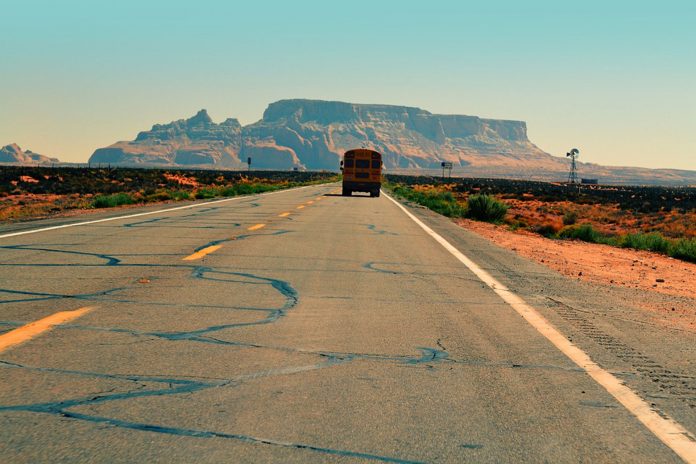The idea of a potential $2 trillion approved by Congress to pay for infrastructure repairs nationwide emerged this week during a White House meeting with President Trump and Democratic Party leaders.
Not surprisingly, there were neither actual details released by the White House nor any specifics on how the funds would impact school bus operations—other than the obvious connection between daily routes and the condition of roads, bridges and highways that they traverse each school day.
The temporary consensus among politicians, special interest groups and the American public seems to be that fixing the nation’s roads and bridges is probably a worthy project. Peter Pantuoso, president and CEO of the American Bus Association, said on Thursday that the motorcoach industry is encouraged by the bipartisan effort.
The controversy is over how to foot the bill. The infrastructure package that President Trump, House Speaker Nancy Pelosi, and Senate Majority Leader Chuck Schumer agreed to on Tuesday is about half of the entire annual federal budget. And the federal debt is already at $22 trillion and rising.
Increased taxes would be almost certain to result, such as hiking the federal gasoline tax, as Ken Presley, the United Motorcoach Association’s vice president of government affairs, pointed out in his analysis on Wednesday. A bill would also likely attempt to gut dozens of federal programs. Students who rely on free or reduced lunch better get it while it’s hot. The same goes for those who rely on Head Start, federal student loans, Medicare, etc.
Given the challenge of reaching an agreement on the last federal budget, after a weeks-long government shutdown, it remains to be seen if an infrastructure bill will be too tall of a task for Congress to complete, especially in the run-up to an election year.
The odds are that there will never be an agreement on rebuilding all of the nation’s worst, most decrepit and dangerous bridges, at least to the magnitude discussed during Tuesday’s high-powered meeting. What is left is how to assess the worst of the worst bridges, roads, and highways that are in desperate need of repair, and then reaching a funding agreement on those.
Just for fun, factor in the following: 20 or more presidential candidates screaming at each other or at President Trump, or the President at his critics; the continual partisan acrimony over the Robert Mueller investigation and report; more Congressional hearings, large and small; the President’s history of cutting taxes, not raising them; and another possible government shutdown later this year.
In order to pay for fixing the most important infrastructure, we may all have to get used to the idea of more frequent public-private partnerships. How does the FedEx Golden Gate Bridge sound? The eBay Bridge, connecting San Francisco to Oakland? The Microsoft Brooklyn Bridge to Tomorrow?
Cheeto’s Route 66 sounds yummy, while the Dell Computer LBJ Highway, maybe not so much. How about the 7Up Interstate 70, Amazon Interstate 10, or Facebook Friends Freeway? The Sizzler Steakhouse Highway between Palm Springs and Las Vegas could finally have its pot-holes filled, curves straightened, dips and bumps leveled, and slurry-sealed every two years.
And locally, instead of Bob’s Insurance Agency being simply the sponsor for your kid’s Little League uniforms, it may be time to hit up other small local businesses to help fix the roads. Just imagine the street signs that would proclaim, “Paved by Bob’s Insurance Agency,” or “Wilson Recycling Center, We Recycle & Repaired your Neighborhood.”
Related: EPA Awards Clean School Bus Grants in Several States
Related: EPA Accepting Applications for DERA School Bus Rebates Program
Related: EPA Extends Clean Diesel Tribal Grant Applications Timeline
Related: EPA Announces DERA Funding Recipients
Related: California Lower-Emission School Bus Program Issues Revisions
Related: EPA to Propose New Standard on NOx Emissions
Related: EPA Grant Brings 4 Blue Bird Electric School Buses to New York District
Related: EPA Announces Latest School Bus Rebate Awards
















